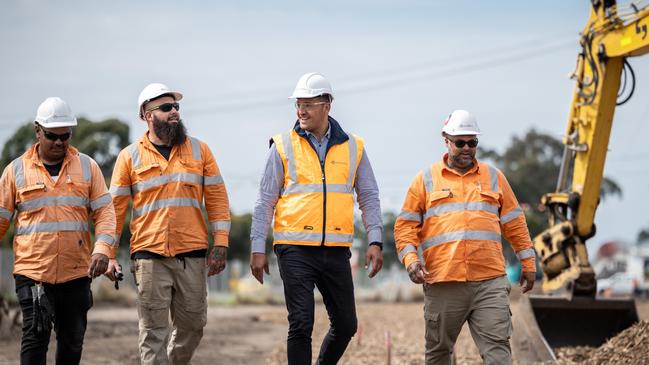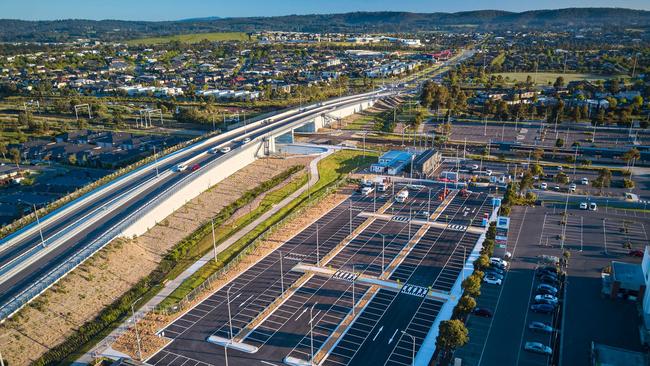First Nations building: How Hayden Heta’s Wamarra broke new ground for Indigenous construction jobs
Seeing a mismatch between construction sector opportunities and Indigenous youths looking for work, footballer Hayden Heta decided to solve it.

Hayden Heta remembers coaching a football team and being inundated with resumes from his players as a key moment in becoming an Aboriginal entrepreneur.
The players were desperate for an opportunity, but there was a frustrating disconnect between their hopes and the entrenched system they were trying to break into.
They weren’t necessarily after a footy career, but in the construction sector in Melbourne where billions of dollars are being spent on an infrastructure boom that is transforming the city through a variety of transport projects.
The issue, Heta could see, was mandated targets around employment opportunities for Aboriginal people that state governments have put in place in procurement requirements on the big projects.
“There is a perception that there were all these jobs, but at community level I could see disappointment on the faces of these young men, and the struggles they had trying to get their foot in the door and make a career of it in the construction sector,” Heta says.
While well-intentioned, the requirements often mean temporary work for Aboriginals on the projects via labour hire firms. Employee targets are met but there can be little prospect of full-time employment or a pathway to a permanent career in construction and higher skilled roles in engineering and other related industries.
Heta, 39, after earning qualifications and working as a park ranger and then a decade in the Victorian public service, decided to tackle the problem himself and make the move from bureaucracy to business.
“I was getting all these resumes because people knew I’d worked at [government agency] Rail Projects Victoria … but I didn’t know where to hand them out. It’s not as easy as going to your tier one builders and saying, here’s a resume. And the responsibility for Aboriginal employment tends to get pushed down to the lower tiers [of the construction sector].
“So with all these resumes and the disappointment in all these young people who I could see wanted an opportunity, came that realisation for me that I needed to do something about it.”
The enthusiasm of the players Heta coached at Fitzroy Stars, a notable lower-league club stemming from the Aboriginal community in Melbourne’s north, for work eventually led to him starting his own indigenous contracting business, Wamarra.
Its success so far, Heta proudly reveals, has led to at least four of his workers having secure enough work to be able to get loans to buy houses, the first in their family history.
But Heta says that is only the beginning for Wamarra, which he owns with minority business partner Symal Group, a Melbourne construction and logistics contractor.
A little more than two years after founding Wamarra just before Covid first hit in March 2020, Heta now oversees a business that has quickly grown from a handful of staff and little revenue to one that has 48 full-time Aboriginal employees out of 79 total workers.
In the same time, Wamarra’s revenue has increased to $33m in the recently completed 2022 financial year and is forecast to rise to $45m in the next 12 months.
The firm has bigger plans though.
“We’ve set ourselves a target of having 100 Aboriginal employees within the next two years,” Heta says. “We’re talking about revenue hitting $100m as well.”
As well as its focus on employing Aboriginals, what also makes Wamarra different from other firms in its sector is that all its workers are employed full-time. There is little subcontracting from project to project. Instead, Wamarra’s growing workforce moves with the work that Heta and his management team wins.
With that, Heta says, brings pressure to keep the pipeline of work going. Victorian government mandates that call for 3 per cent of spending on projects to be with social enterprises or Aboriginal businesses, or 2.5 per cent of working hours to be undertaken by Aboriginals.
But Heta doesn’t want Wamarra to just be a “tick the box exercise” for the consortiums of contracts that bid for and win work on the big projects. While much of Wamarra’s work for now is the building of the temporary compounds that house site offices and landscaping works at the end of projects, he wants to establish a training academy to upskill his workers in order to win more complex work.
Heta also has ambitions to run financial management courses for them as part of a strategy of embedding longer-term life and work skills that he wants embedded in the Wamarra workplace culture.
“People talk about a skills shortage but there is not a lack of people wanting those skills. But I’m also interested in soft skills. Punctuality, accountability, reliability. Our employees are now earning a decent wage, but is anyone helping them manage their money? When we invest in Aboriginal employees we like to say we are not just investing in them, but in their families and the broader Aboriginal community.
“We’re starting to unpack what all this means for our business. That is why we are trying to think long-term. If we wanted to, we could engage 30 Aboriginal people tomorrow. But that’s not going to help the business and it’s not going to help the individuals. We’re trying to grow sustainability and in a measured way.”
In a paper published by the Reserve Bank of Australia in June, “First Nations Businesses: Progress, Challenges and Opportunities,” Melbourne Business School’s Michelle Evans and Cain Polidano say Australia’s First Nation’s business sector is growing at about 4 per cent in size per annum but that is from a low base and “many budding First Nation entrepreneurs still face substantial barriers to establishing a successful business.”
Evans and Polidano write that “trust” in a business is crucial to its success. “Trust in our economy is conditional on membership of a group that is deemed worthy of trust,” their paper says.” This is based not only on race but also on crude indicators of trustworthiness, including well-resourced networks, past intergenerational advantages, business experience, financial and other assets, and education qualifications.”
Heta admits there was “an apprehension” in dealing with Wamarra by other companies when he started it. “There is this, I think unfair, perception that Aboriginal businesses come with risk.”
He has worked to minimise that risk, firstly by earning a graduate certificate in business management, and then joining with Symal after being introduced to its owners by another Aboriginal entrepreneur, Gary Mongta of Monero Constructions.
“We had a three-hour meeting with no agenda. But at the end of that, we found we had a lot of synergies. They then employed me for six months in their business to essentially shape what is Wanarra,” says Heta.
““We now utilise all the systems that sit behind what is a tier 2 contractor with their safety, [human resources], training and development processes. So we have been able to hit the ground running and alleviate some of the risk profile that is associated with smaller businesses.”
Next comes refining what Heta calls his company’s three key pillars: continuity of employment for his employees, their training and development, including individually tailored training plans and future cadetships and scholarships, and providing what he calls a culturally safe work environment.
“We don’t isolate anybody, or put people in uncomfortable positions. You’ve got myself as a proud Aboriginal man as a managing director. We’ve got a proud Aboriginal man as the area manager, managing all the blue collar workforce. So you got to strong Aboriginal leaders.
And we’ve also got wonderful stories from our non-indigenous workers too, about the hardships they have overcome to get into the industry.
“That’s the beauty of our business. Because of the people we represent, we tend to be more welcoming.”

Some of the Melbourne projects built by Wamarra’s employees include the Cardinia Road Station carpark, left, and Carnegie Open Spaces,
When we invest in Aboriginal employees …
we are not just investing in
them but in … the broader Aboriginal community




To join the conversation, please log in. Don't have an account? Register
Join the conversation, you are commenting as Logout